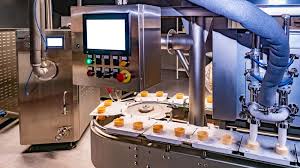Numerical control (NC) in industrial automation has long been synonymous with precision and efficiency in various manufacturing sectors. In the realm of food manufacturing, NC and its more advanced counterpart, Computer Numerical Control (CNC), are revolutionizing the way food products are produced, packaged, and distributed. This integration of sophisticated technologies, including servo drives and motors, is enhancing the capabilities of food manufacturers to meet the increasing demands for consistency, safety, and quality.
Numerical Control: A Primer
Numerical control involves the use of computerized controls to operate and automate machinery and tools. In food manufacturing, this technology governs the operations of various types of equipment—from mixers and conveyors to packaging and labeling machines—ensuring they perform with high precision and minimal human intervention.
Key Applications of Numerical Control in Food Manufacturing
1. Processing and Preparation: NC systems are pivotal in controlling the operation of machinery used in the processing and preparation of food. This includes everything from cutting and slicing equipment to mixers and blenders. For example, CNC technology allows for the precise cutting of meats and vegetables, ensuring uniformity that is crucial for both aesthetic appeal and cooking consistency.
2. Filling and Packaging: In the packaging phase, numerical control systems manage the machinery responsible for filling, weighing, and sealing products. Servo motors, like 8LS Synchronous Motors, are particularly important here, as they allow for the precise control of movement, ensuring that each package is filled with the exact amount of product required, thereby reducing waste and ensuring compliance with weight regulations.
3. Labeling and Quality Control: NC systems also extend to labeling operations where precision is crucial. Servo-driven labeling machines apply labels at precise locations on the packaging, accommodating various package sizes and shapes without human adjustment. Furthermore, NC systems can integrate with vision systems for quality control, automatically inspecting each item as it moves along the production line to ensure it meets quality standards.
Benefits of Numerical Control in Food Manufacturing
1. Enhanced Efficiency: By automating repetitive tasks, NC systems significantly speed up the production process and enable continuous operation, which is essential in meeting high production targets and reducing downtime.
2. Improved Product Quality: The precision afforded by NC and CNC systems ensures that every product is manufactured to the same standard, which is vital in maintaining consumer trust and satisfaction. This consistency is especially important in food manufacturing, where variability in product size, weight, or appearance can affect brand reputation.
3. Cost Savings: Although the initial investment in NC technology can be substantial, the long-term savings are significant. Reduced labor costs, decreased waste, and the ability to operate continuously contribute to a more economical manufacturing process.
4. Safety and Hygiene: Automating food manufacturing processes reduces the need for human contact, which is crucial in maintaining food hygiene and safety standards. Machines can also operate in environments that may be hazardous to humans, such as extreme temperatures or under conditions requiring high cleanliness.
Challenges and Future Directions
While the benefits are clear, the integration of numerical control in food manufacturing also presents challenges. The complexity of setting up and maintaining NC systems requires significant investment in both technology and skilled personnel. Moreover, as these systems become more integrated and reliant on sophisticated software, cybersecurity becomes a concern.
Looking forward, the future of NC in food manufacturing is likely to be shaped by further advancements in AI and machine learning, enabling even greater automation and efficiency. These technologies could lead to smarter, more adaptive NC systems that can self-optimize and make real-time adjustments based on environmental and production data.
Conclusion
Numerical control has carved a niche for itself in the food manufacturing sector by driving innovation and efficiency. With the integration of advanced servo drives and motors, NC systems provide the precision and reliability necessary to meet the modern demands of food production. As technology evolves, the scope and effectiveness of these systems will only increase, continuing to transform the landscape of industrial automation in food manufacturing.






